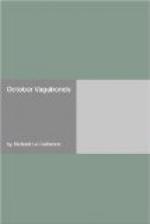Surely the sky is the greatest of all melodramatists. Nothing short of the cataclysmal end of the world could have provided drama to match the stupendous stage-setting of that stormy sky. All doom and destiny and wrath of avenging deities and days of judgment seemed concentrated in that frown of gigantic darkness. Beneath it the landscape seemed to grow livid as a corpse, and terror to fill with trembling the very trees and grasses. Oedipus and Orestes and King Lear rolled into one could hardly have accounted for that angry sky. Such a sky it must have been that carried doom to the cities of the plain. And, after all, it was only Colin and I innocently making haste to Dutch Hollow!
That Teutonic spot seemed hopelessly far away as the rain began to drive down and the horizon to open here and there in lurid slashings of stormy sunset; and when the road, which for some time had been one long descent, suddenly confronted us with a rough, perpendicular lane, overgrown with bushes, that seemed more like a cart-track to the stars than a sensible thoroughfare, we realized, with a certain indignant self-pity, that we were walking in real earnest, out in the night and the storm, far from human habitation.
“Nature cannot be so absurd,” said I, “as to expect us to climb such a road on such an evening! She must surely have placed a comfortable inn in such a place as this, with ruddy windows of welcome, and a roaring fire and a hissing roast.” But, alas! our eyes scanned the streaming copses in vain—nothing in sight but trees, rain and a solitary saw-mill, where an old man on a ladder assured us in a broken singsong, like the Scandinavian of the Middle West, that indeed Nature did mean us to climb that hill, and that by that road only could we reach the Promised Land of supper and bed.
And the rain fell and the wind blew, and Colin and I trudged on through the murk and the mire, I silently recalling and commenting on certain passages in certain modern writers in praise of walking in the rain. At last the hill came to an end—we learned afterward that it was a good mile high—and we stumbled out on to some upland wilderness, unlit by star or window. Then we found ourselves descending again, and at last dim shapes of clustered houses began to appear, and the white phantom of a church. We could rather feel than see the houses, for the night was so dark, and, though here was evidently a village, there was no sign of a light anywhere, not so much as a bright keyhole; nothing but hushed, shuttered shapes of deeper black in the general darkness. So English villages must have looked, muffled up in darkness, at the sound of the Conqueror’s curfew.
“Surely, they can’t all be in bed by seven o’clock?” I said.
“There doesn’t seem much to stay up for,” laughed Colin.




